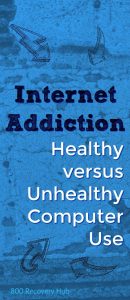Gaming Addiction
Anyone who has experienced it knows all too well – video game addiction is real. Although gaming addiction is not yet officially recognized as a diagnosable disorder by the American Medical Association, there is increasing evidence that people of all ages, especially teens and pre-teens, are facing very real, sometimes severe consequences associated with compulsive use of video and computer games.
Video games are becoming increasingly complex, detailed, and compelling to a growing international audience of players. With better graphics, more realistic characters, and greater strategic challenges, it’s not surprising that some teens would rather play the latest video game than hang out with friends, play sports, or even watch television.
Of course, all gamers are not addicts – many teens can play video games a few hours a week, successfully balancing school activities, grades, friends, and family obligations. But for some, gaming has become an uncontrollable compulsion. Studies estimate that 10 percent to 15 percent of gamers exhibit signs that meet the World Health Organization’s criteria for addiction. Just like gambling and other compulsive behaviors, teens can become so enthralled in the fantasy world of gaming that they neglect their family, friends, work, and school.
If you or a loved one shows signs of computer or video game addiction, this website is for you. Here, you will find up-to-date information and resources that will help you assess whether gaming has gone from an entertaining pastime to a full-blown obsession. From signs and symptoms to advice for parents and treatment options, this site offers advice and solutions to help bring compulsive gamers back to real life.
Internet & Computer Addiction
While time spent online can be hugely productive, compulsive Internet use can interfere with daily life, work, and relationships. When you feel more comfortable with your online friends than your real ones, or you can’t stop yourself from playing games, gambling, or compulsively checking your smartphone, tablet, or other mobile device—even when it has negative consequences in your life—then you may be using the Internet too much. Learn about the signs and symptoms of Internet addiction and how to balance your life online and off.
What is Internet addiction or computer addiction?
Internet Addiction, otherwise known as computer addiction, online addiction, or Internet addiction disorder (IAD), covers a variety of impulse-control problems, including:
- Cybersex Addiction – compulsive use of Internet pornography, adult chat rooms, or adult fantasy role-play sites impacting negatively on real-life intimate relationships.
- Cyber-Relationship Addiction – addiction to social networking, chat rooms, texting, and messaging to the point where virtual, online friends become more important than real-life relationships with family and friends.
- Net Compulsions – such as compulsive online gaming, gambling, stock trading, or compulsive use of online auction sites such as eBay, often resulting in financial and job-related problems.
- Information Overload – compulsive web surfing or database searching, leading to lower work productivity and less social interaction with family and friends.
- Computer Addiction – obsessive playing of off-line computer games, such as Solitaire or Minesweeper, or obsessive computer programming.
The most common of these Internet addictions are cybersex, online gambling, and cyber-relationship addiction.
Healthy vs. unhealthy Internet use
The Internet provides a constant, ever-changing source of information and entertainment, and can be accessed from most smartphones as well as tablets, laptops, and desktop computers. Email, blogs, social networks, instant messaging, and message boards allow for both public and anonymous communication about any topic. But how much is too much Internet usage?
Each person’s Internet use is different. You might need to use the Internet extensively for your work, for example, or you might rely heavily on social networking sites to keep in touch with faraway family and friends. Spending a lot of time online only becomes a problem when it absorbs too much of your time, causing you to neglect your relationships, your work, school, or other important things in your life. If you keep repeating compulsive Internet behavior despite the negative consequences in your offline life, then it’s time to strike a new balance.
How do people become addicted to the Internet?
To relieve unpleasant and overwhelming feelings many people turn to the Internet in order to manage unpleasant feelings such as stress, loneliness, depression, and anxiety. When you have a bad day and are looking for a way to escape your problems or to quickly relieve stress or self-soothe, the Internet can be an easily accessible outlet. Losing yourself online can temporarily make feelings such as loneliness, stress, anxiety, depression, and boredom evaporate into thin air. As much comfort as the Internet can provide, though, it’s important to remember that there are healthier (and more effective) ways to keep difficult feelings in check. These may include exercising, meditating, and practicing simple relaxation techniques.
For many people, an important aspect of overcoming Internet and computer addiction is to find alternate ways to handle these difficult feelings. Even when your Internet use is back to healthy levels, the painful and unpleasant feelings that may have prompted you to engage in unhealthy Internet use in the past will remain. So, it’s worth spending some time thinking about the different ways you intend to deal with stressful situations and the daily irritations that would normally have you logging.